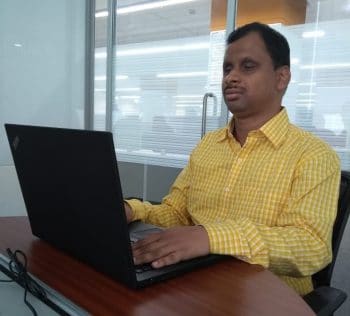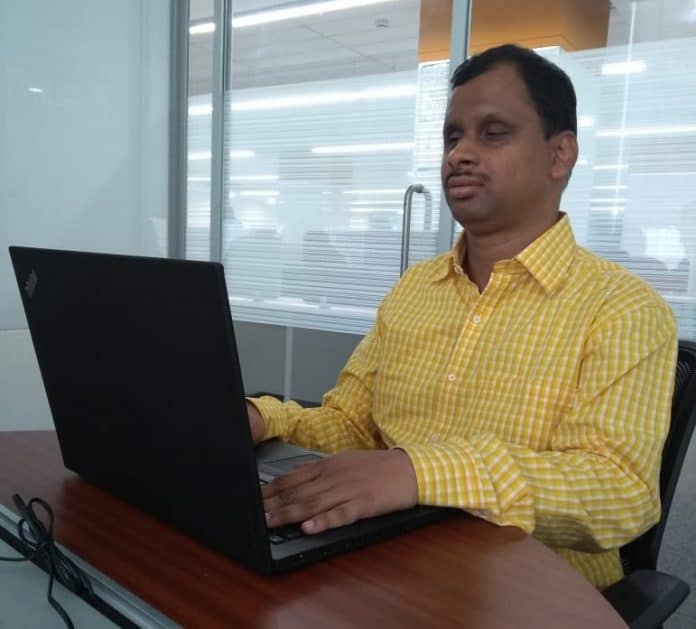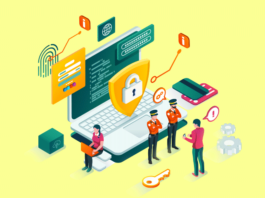He can’t see, but he gives digital vision to many students in rural parts of India. He believes – “Vision is important more than sight. Knowledge is important more than information”

Meet Krishnakant Mane, an open source advocate and India’s first visually impaired IT professional – he is the third such person in Asia. He is also the founder of Digital Freedom Foundation, an organization dedicated towards bringing freedom of technology in education. Apart from advocacy based on free software, the foundation also takes up projects on Rural digital empowerment and ICT based infra structure in rural parts of India.
Besides these activities, the foundation also actively participates in development of Free and Open Source Software (FOSS) for education, health and finance sectors.
From Love at First Encounter to Becoming his Life’s Mission
For Krishnakant, popularly known as KK in the open source community, FOSS means ‘Free as in Freedom and Not Free of Cost’
“It gives the much-needed digital freedom to me and anyone who is using it. There is total transparency in the software and given that it is an open platform for developers and users alike, everyone has a say. Basically, it’s digital democracy,” says KK.
KK’s first encounter with open source was in 2005 when he started using shell with Emacs. He was then a well-established IT professional working on good deal of high-end projects.
“I had heard about Linux but never used it. I got the opportunity to try it out in one of the Linux user group meetings and the person doing the demo was Dr. Nagarjun from Homi Bhabha Centre for Science Education,” he recalls.
Not just he became aware of the accessibility options, but straightway he was able to see how cost-effective and powerful open source software are, and how it can impact the digital technology in a nutshell.
From that day onward, he started to pay more and more attention to the developments happening in FOSS world. Today it has become his life’s mission to replace costly proprietary programs with open source alternatives.
“Emacspeak was my first screen reader cum audio desktop. It is developed by T.V. Raman who is himself visually impaired. Orca, the professional quality screen reader is what I use day in and day out. I was greatly involved in its initial days of development,” KK says proudly.
Through his NGO, Digital Freedom Foundation, he is also trying to bring freedom of technology in education using free software as he believes “digital freedom is fundamental to life.”
The People Behind His Success
Starting with Dr. Nagarjun, there are many people who played significant roles in strengthening KK’s connect with FOSS.
Some of them are Dr. Jaijit Bhattacharya from erstwhile Sun Micro systems, Valsa Villiams, former director of Intel (whom he immensely respect), Sunil Abraham from Computer Internet Society (CSI) and Dr. Richard Stolman, with whom KK spent several exciting days when he came to India.
Thanks to them, today KK has become a source of inspiration for many students and aspiring programmers.
Working as a professional FOSS consultant for more than 10 years, he helped many organizations shift from proprietary to open source infrastructure. One example is Rahuri Paper mills (now closed).
In addition, he professionally assisted several colleges and universities in shifting to FOSS. The UMIT (Usha Mittal Institute of Technology) department of the SNDT Women’s University is one big success story, where KK and Prof Shitole started the FOSS movement back in 2008.
KK has been giving workshops and seminars in India and overseas on career opportunities in FOSS, MVC based open source frameworks like Django and Pyramid. He also conducts workshops on Python and related technologies, all open source of course.
The Challenges That He Had to Overcome
However, the journey was not so rosy as it seems to be.
“I met a lot of wonderful friends and mentored extremely talented students, I guess they would be in a position to teach me a thing or two now. But I had lot of enemies too. Professional jealousy, extreme politics and several other things exist in open source world,” he laments.
“Many believe that it is a sin to earn money from the same open source project to which I dedicated 10 + years of my life. In addition, many are still not aware that business can grow infinitely in open source,” he continues.
This is the reason why it took a lot of time for screen reading programs to reach the maturity level of some proprietary alternatives, he points out.
Another challenge, according to him, is getting funds for open initiatives. Proprietary programs grow superior due to good financial resources.
India’s Position in the Global FOSS Ecosystem
Although there are very few “Made in India ” open source products (GNUKhata being one of the few), KK says a lot of individuals from India are being recognized worldwide.
According to KK, health, education and finance are the forerunners in adopting FOSS in India.
As one of the measures to strengthen the position of India in the global FOSS ecosystem, KK suggests that colleges should encourage interns to exclusively take up open source projects for their final year.
By doing so, he believes, we will be able to produce more human resources.
“The central/state governments can also play a huge role by using and implementing free software wherever it is possible. Not just it saves a lot of money (and thus reduce corruption), taxpayers’ money is better utilized and there is total transparency. There should be IT related policies with budget exclusively for open source,” he opines.
His Advice to the Youngsters
To the youngsters who are considering a career in FOSS technology, KK says “learn whatever you are learning right now, because 99 percent chance is that it is all open source.”
Interestingly, big data, cloud applications, android-based applications, object databases (like Mongo) data science, and all that is used in industry happen to be all open source.
It is just that people are unaware that these are all open source technologies/ platforms. Python and Java is open source, PHP is open source and so is MySQL. Audacity, the famous sound editing tool is also the same.
KK tells the youngsters to take advantage of these existing open source projects but also requests them to “contribute back wherever possible.”
The FOSS advocate concludes the conversation saying, “Open source is a challenge as well as a great opportunity.”




